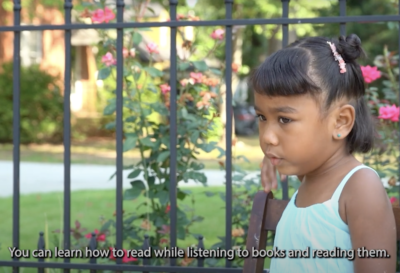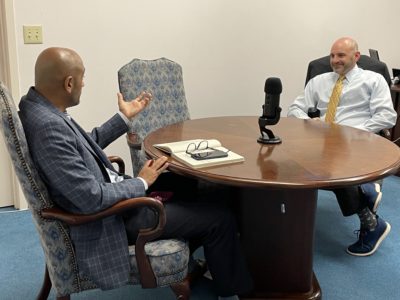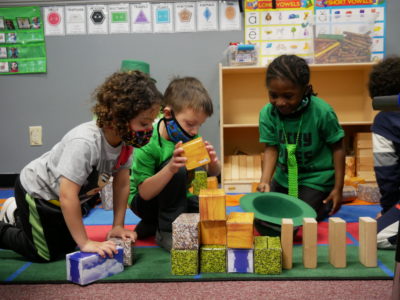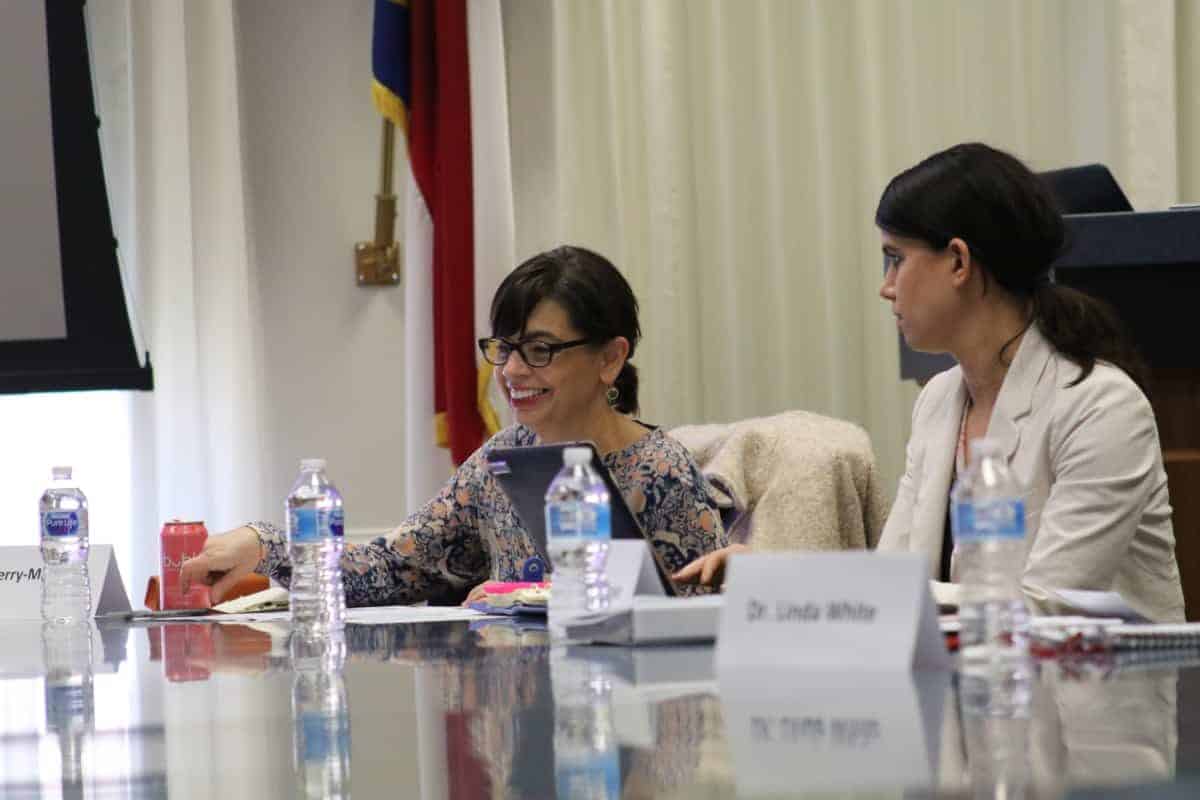
|
|
A council on learning in the first eight years of children’s lives met virtually this week to restart its work in creating a plan for a coordinated system of early education in North Carolina.
The B-3 Interagency Council, created by law in 2017 “to establish a vision and accountability” for early education, returned to its 2019 recommendations on Wednesday with a different context after two years of pandemic disruptions.
Those recommendations included proposed legislative and administrative changes to how the state collects data about young children, how the state transitions children from early childhood to K-12 environments, and how teachers and administrators are prepared and measured.
“To be quite honest, it’s 2021. We’re looking at the holidays,” said Susan Gates, council member and special advisor on education initiatives at SAS Institute.
In the last two years, a lot has changed. A law passed this year is aimed at improving preparation for aspiring teachers learning how to teach reading in pre-K through third grade. Implementation of that law is under way in the UNC system, which prepares 40% of the state’s public school teachers; in the community college system; and at the Department of Public Instruction (DPI).
Gates suggested considering the ways the law’s implementation should alter the group’s plans.
More on the “science of reading” law
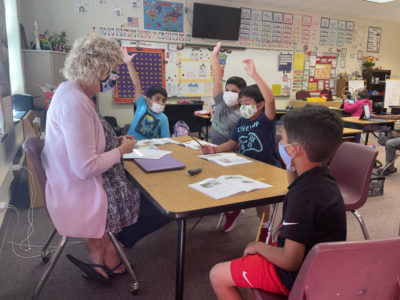


Meanwhile, early educators and young children have faced a variety of pandemic challenges. In early elementary grades and some pre-K classrooms, instruction shifted online, then to hybrid models, then to in-person learning with increased safety precautions and quarantine procedures. And early childhood classrooms outside of public school districts remained open when they could, first to care for children of essential workers and then for any children who needed a place to go while their parents worked. That included school-age remote learners.
Enrollment dropped across the board.
“We know that 9,100 fewer children participated in NC Pre-K this last school year,” Gates said. “They’re gone. They’re not 4 years old anymore. And 15,000 kindergartners did not show up. I think we need to think about what we do know about the impacts from COVID … and trying to build on that.”
More on pandemic early learning
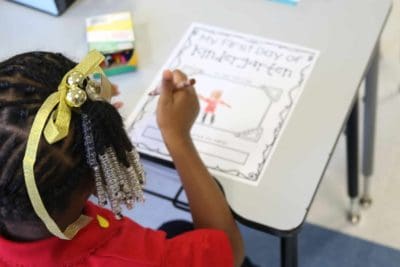
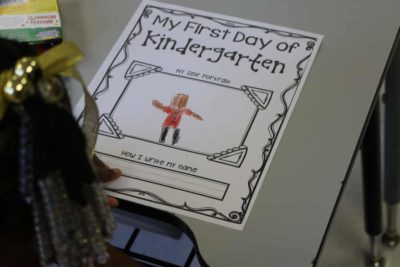
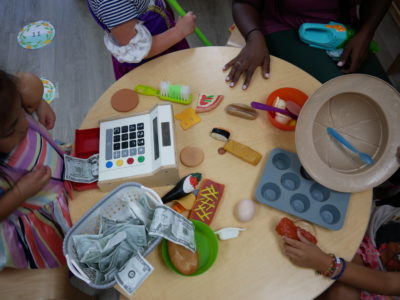
Though new policies and challenges exist, the council’s task is the same — coordination across a variety of early learning environments that often do not communicate with one another and have different educator requirements, standards, and governing bodies.
K-12 education falls under DPI, while NC Pre-K and child care oversight falls under the Division of Child Development and Early Education (DCDEE) at the Department of Health and Human Services (DHHS). Funding and requirements within early childhood classrooms are often blended from a variety of public and private sources from local, state, and national streams and programs.
Sign up for Early Bird, our newsletter on all things early childhood.
Work groups will meet in the coming months to form new recommendations on transitions from early childhood to K-12, teacher and administrator preparation, family engagement, and standards, assessment, instruction, and environment. You can find the members of each work group below. The full council’s next meeting will be in December.
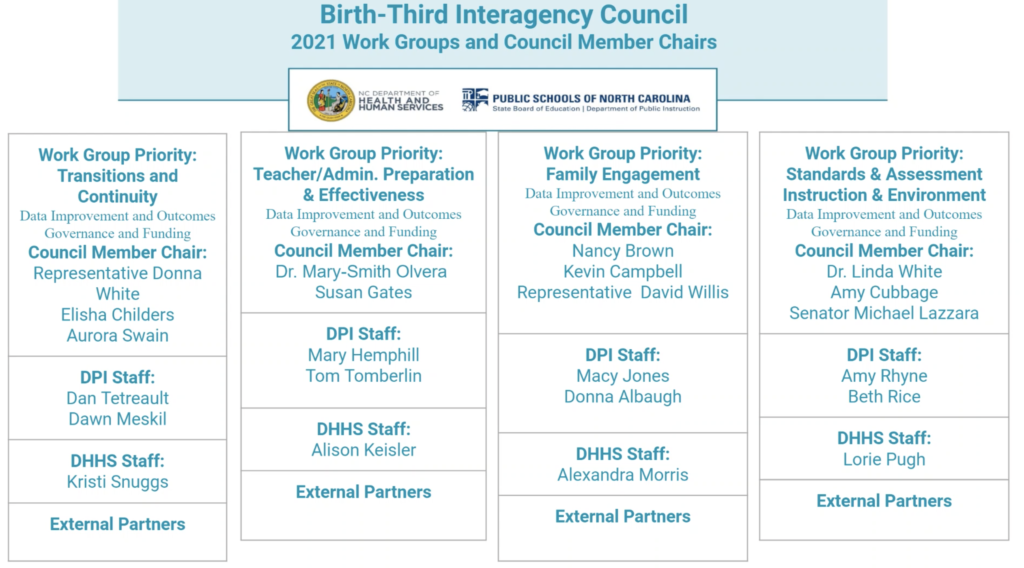
Data as a first step forward
Out of the three categories of 2019 recommendations, the entire team heard updates from “Data Driven Improvement and Outcomes.” All of its 2019 recommendations have been completed, including an analysis and survey of stakeholders that use the data the state provides on early childhood experiences.
“When we think about data, I really hope that we remember that this isn’t numbers, this is about people,” said Rebecca Feinglos Planchard, senior early childhood policy advisor at DHHS.
A new public dashboard and a report on the pandemic’s impact on the child care landscape are coming soon, Planchard said. She provided the following slide with examples of existing data and data the division is working to include in different initiatives. The public dashboard will include aggregate data on such things as NC Pre-K and child care subsidy enrollment.
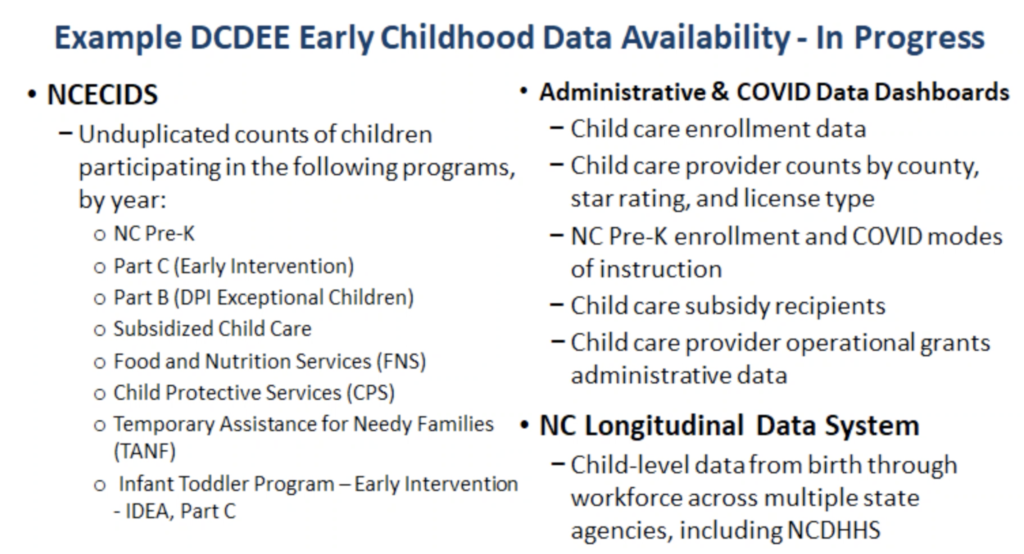
The division has used federal funds to make technical updates to the North Carolina Early Childhood Integrated Data System (NCECIDS), including a new way for researchers to request child-specific data to answer key research and policy questions.
Information from NCECIDS will flow into the North Carolina Longitudinal Data System (NCLDS), which leaders have been working to strengthen. This system is supposed to link cross-agency information on students from early childhood to workforce entry.
Planchard said DCDEE has been partnering with other government departments “to ensure that the (NCLDS) really does start from birth and is able to provide people — researchers and public servants across state agencies, local partners as well — with this type of information to be able to not look at data sources in isolation when it comes to early childhood, but actually follow young children in the long term.”
On the K-12 side of things, the council learned about DPI’s changes in assessment and data from Michael Maher, executive director of the new Office of Learning Recovery & Acceleration. Go here to learn more about what that office’s goals are as students recover from lost learning time.
In kindergarten, the NC Early Learning Inventory has been updated to provide teachers with more helpful information on students as they transition from pre-K to kindergarten. In K-3 classrooms, the state has returned to a new version of mCLASS to measure reading proficiency as the law aligning teacher knowledge with scientific research is implemented.
And across K-5, the office will be studying student outcomes as a result of the pandemic and the impact of recovery strategies on students’ academic and overall wellbeing.
The state will be asking why different districts fared better than others, how modes of instruction affected learning, and what are the best practices to scale up.
“If we’re going to continue to have disrupted learning for the next year,” Maher said, “we want to be sure we’re providing the best quality experience for students.”
Recommended reading
